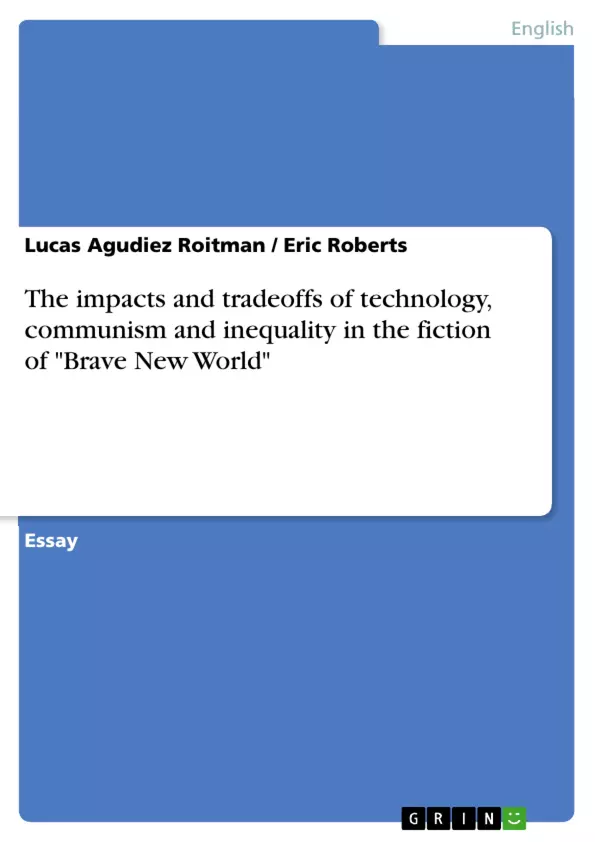In Aldous Huxley’s piece, “Brave New World”, one can find multiple ideas taken from Marxist ideology; specifically from Marx’ and Engels’ Communist Manifesto. The role of technology is in both works related to the creation of multiple classes, although with different power structures. This paper will analyze to what extent technology is pertinent in the pursuit of utopia, drawing parallels from the Communist Manifesto (where technology, which leads to a particular mode of production, is under attack) and the fictional piece, Brave New World (where technology also impacts the social order arguably negatively).
The economic crisis of 1929, more commonly known as the Great Depression and Keynesian consumerist theory as a response to it, showed that there was a need for an alternative to address the shortcomings of capitalism. Socialism, was an enticing concept that not only sparked revolutions of nation states but also has become entrenched in modern culture.
Inhaltsverzeichnis (Table of Contents)
- Introduction
- State-backed Control
- The class divide
Zielsetzung und Themenschwerpunkte (Objectives and Key Themes)
This paper analyzes the role of technology in the pursuit of utopia in Aldous Huxley's "Brave New World" and its relation to Karl Marx and Friedrich Engels' "Communist Manifesto." It explores how technology, particularly in the context of industrialization and social control, contributes to the creation and maintenance of social classes, ultimately leading to dystopian outcomes.
- The impact of technology on social control and the creation of social classes
- The unintended consequences of utopian aspirations driven by technological advancements
- The role of consumerism and mass consumption in shaping societal values
- The erosion of traditional values, including religion and morality, in the face of technological progress
- The potential for technology to perpetuate social divisions and hinder social mobility
Zusammenfassung der Kapitel (Chapter Summaries)
- Introduction: This chapter introduces the main themes of the paper: the role of technology in achieving a utopian society and the potential for technology to create and maintain social hierarchies. It draws parallels between "Brave New World" and the "Communist Manifesto" in terms of how technology contributes to social order and the creation of distinct classes.
- State-backed Control: This chapter explores the ways in which technology is used to control and condition citizens in "Brave New World." It focuses on the use of hypnopaedia and soma drugs to create a society where citizens are content and compliant, despite being subjected to manipulation and limitations. The chapter also contrasts this approach with the "Communist Manifesto's" vision of social change driven by technological advancements that empower the proletariat.
- The class divide: This chapter analyzes the role of technology in perpetuating social divisions and limiting social mobility in "Brave New World." It discusses how the separation of society into those who have access to technology and those who do not creates a chasm between the "civilized" and the "uncivilized." The chapter also examines the world controller's perspective on social order and how the pursuit of utopia can have unintended dystopian consequences.
Schlüsselwörter (Keywords)
The primary focus of this paper lies on the intersection of technology, social control, and the creation of social classes in both "Brave New World" and the "Communist Manifesto." Key themes include industrialization, utopia, dystopia, social hierarchy, consumerism, mass consumption, and the manipulation of values.
Frequently Asked Questions
What is the connection between Brave New World and Marxist ideology?
The novel explores themes of class division and social control that mirror concepts in the Communist Manifesto, specifically how technology maintains power structures.
How is technology used for social control in Huxley's novel?
Technology is used through methods like hypnopaedia (sleep-teaching) and soma (a mood-altering drug) to ensure citizens remain compliant and content within their assigned social classes.
What role does consumerism play in the World State?
Mass consumption is a tool for stability; by keeping citizens focused on shallow pleasures and consumption, the state prevents political dissent and critical thinking.
Why does technology lead to a "dystopian" outcome in the pursuit of utopia?
While aiming for a perfect society (utopia), the over-reliance on technological control erodes human values like individuality, religion, and genuine emotion.
How does Brave New World reflect the Great Depression era?
The novel responds to the economic crises of 1929 by examining alternatives to capitalism, such as extreme state-backed control and consumerist theories.
- Quote paper
- Lucas Agudiez Roitman (Author), Eric Roberts (Author), 2013, The impacts and tradeoffs of technology, communism and inequality in the fiction of "Brave New World", Munich, GRIN Verlag, https://www.grin.com/document/354900



